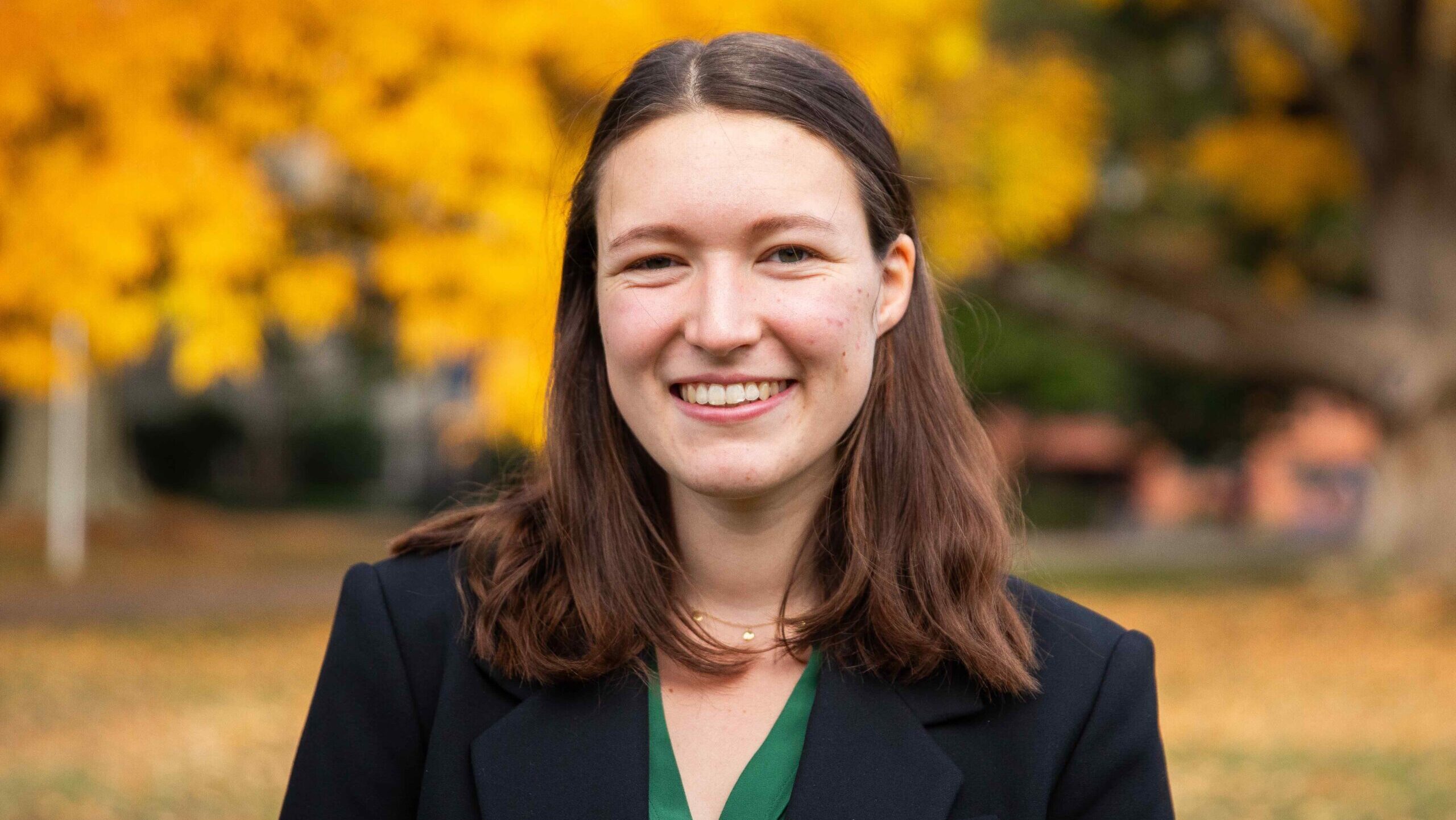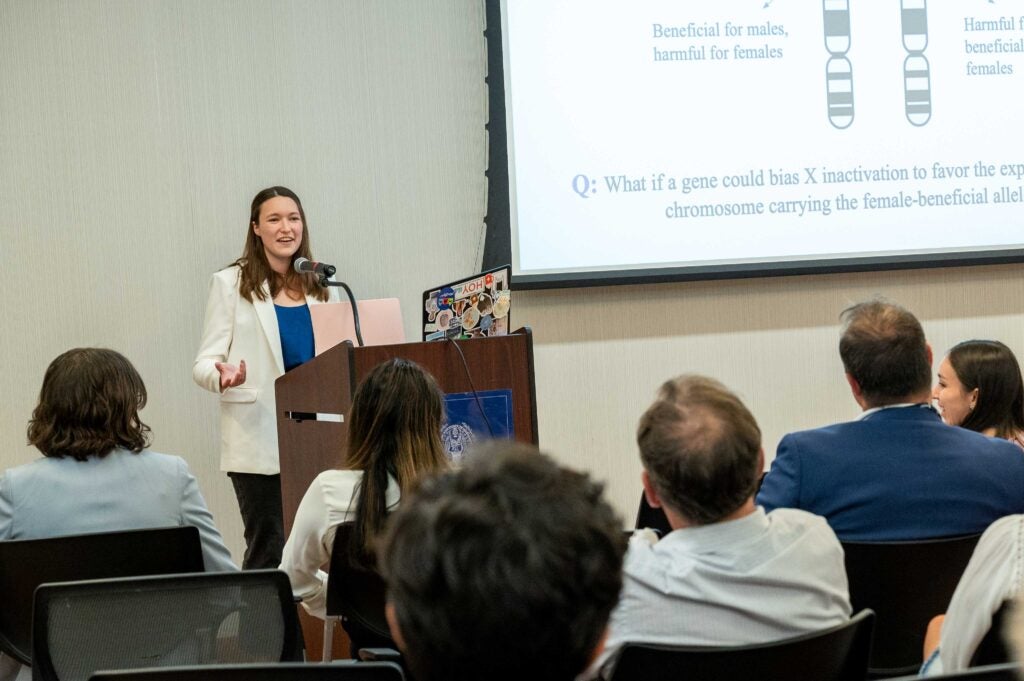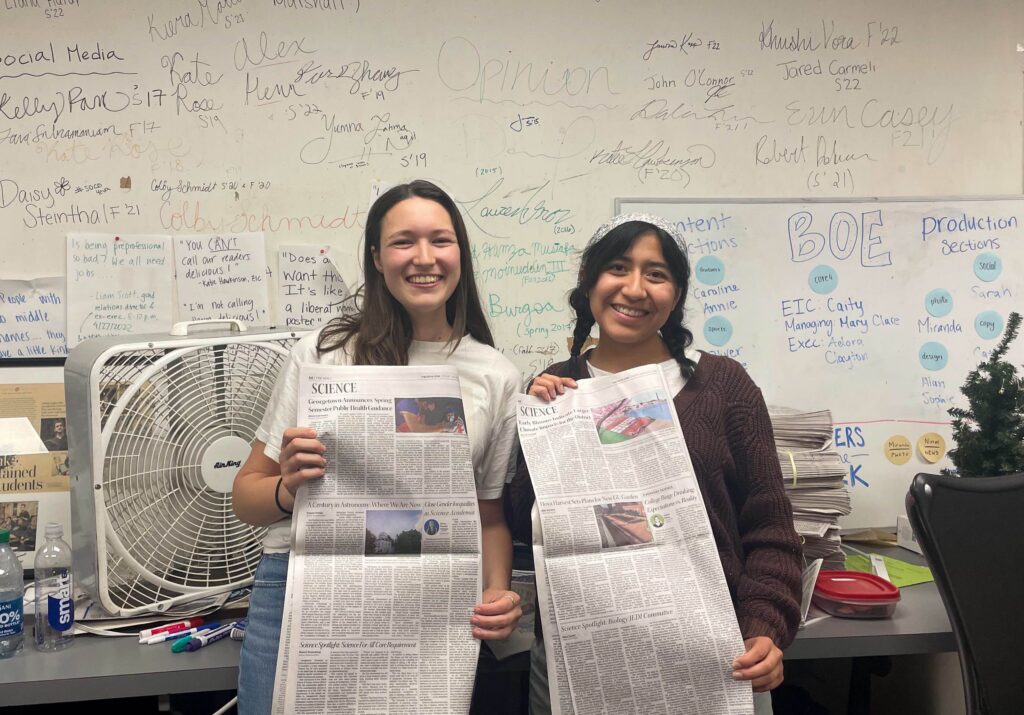Two College Students Named Goldwater Scholars
Two students in the College of Arts & Sciences – Naomi Greenberg (C’24) and Roma Dhingra (C’24) – were named 2023 Goldwater Scholars
Read More
Researcher and writer Naomi Greenberg (C’24) is one of five Hoyas to be named a 2024 Marshall Scholar.
The program, founded by an Act of Parliament in 1953, is one of the most prestigious fellowships available to American students, providing an opportunity to pursue a graduate education in the United Kingdom for up to two years. Since the program’s inception, the only institutions to receive five or more scholarships in a single year are Harvard, Yale, MIT, Stanford, Princeton and, now, Georgetown.
“I see this scholarship as the realization of a massive amount of work,” said Greenberg. “Work from the scholars ourselves, but also from our professors, advisors and peers who helped along the way.”
Through the fellowship, Greenberg will pursue two master’s degrees: one in systems and synthetic biology at Imperial College London and another in science communication and public engagement at the University of Edinburgh.

Naomi Greenberg (C’24) presenting at the Georgetown Undergraduate Research Conference, where she won best overall oral presentation.
“The unique combination of my degrees will give me a valuable perspective and an ability to predict and explain both the short-term and long-term consequences of gene editing,” said Greenberg. “Ultimately, I aspire to lead a research lab to advance the field while being aware of a broader, non-scientific audience.”
Greenberg’s interest in genetic engineering, when humans alter an organism’s DNA, began during an internship at the National Institutes of Health. Working in the lab of Takashi Akera, who studies chromosome dynamics and evolution, Greenberg observed the phenomenon of natural gene drives in mice, where some genetic traits become overrepresented through intragenomic conflict during meiosis. However, according to Mendel’s Law of Segregation, that shouldn’t be possible – two alleles of any gene should have an equal chance of being transmitted.
“The experience of seeing a real gene drive system in action at the NIH was pivotal for me,” said Greenberg. “Witnessing firsthand an exception to the so-called ‘laws’ of genetics turned my theoretical interest into a practical one, and ignited my motivation to become a gene drive researcher.”
In Greenberg’s eyes, genetic engineering is likely here to stay and that means creating scientific consensus around the morals of the issue and communicating to the public what it means and why it is important.
“Gene drive technology is the future, but conducting research and raising awareness about it is the present,” said Greenberg. “The field of genetic engineering is both exciting and risky. I want to be someone who works at this frontier with a socially conscious and responsible perspective.”
Throughout her time as an undergraduate, Greenberg has not only conducted research into molecular biology, molecular genetics and evolutionary genetics, but explored other passions both on the Hilltop and beyond.
“Naomi is a special scholar – some are good at generating questions and others at working toward their answers. And then there is Naomi, who is unusually good at both,” said Manus Patten, a teaching professor in the Department of Biology who mentored much of Greenberg’s research. “It’s going to be fun over the next few years to watch as she makes the most of these opportunities. I feel like we’re at Cape Canaveral here, watching a scholar launch.”

From left to right: Naomi Greenberg (C’24) and Cece Ochoa (C’24), the inaugural editors of The Hoya’s science section.
In addition to her time at the NIH, Greenberg spent a summer conducting research for the Max Planck Institute for Brain Research, where she worked in neurobiologist Erin Schuman’s lab to optimize research experiments and learn molecular biology techniques. This research was supported by a Royden B. Davis Fellowship.
A biology major and journalism minor, Greenberg has sought to unify her love for research and communication. She interned on the communications team at the Smithsonian National Museum of Natural History, where she penned articles for their Ocean Portal website and Smithsonian Magazine.
On campus, Greenberg spent all four years involved with The Hoya, working as a copy assistant, copy deputy and copy chief. She then founded and led the publication’s science section, which shines a spotlight on science-related news on the Hilltop and beyond.
In the spring, Greenberg was awarded the prestigious Goldwater Scholarship, one of just 413 recipients in the entire country, for her research in theoretical evolutionary genetics. Established by Congress in 1986 to honor U.S. Senator Barry Goldwater, the scholarship provides up to $7,500 to sophomores and juniors who are pursuing research in the fields of mathematics, engineering or the natural sciences.
For Greenberg, faculty mentorship and guidance has been a highlight of her time on the Hilltop.
“Practically every professor I have had at Georgetown has been supportive, encouraging and inspiring,” said Greenberg. “Professor Manus Patten, my research mentor, has always gone above and beyond to help me feel supported, yet independent and capable of my own research. In addition, Professors Sarah Johnson and Ronda Rolfes have given me incredible mentorship and career advice. They are amazing role models as I look ahead to a career in research and teaching.”
After completing her degree programs in the United Kingdom, Greenberg plans to return to the United States and pursue a Ph.D. in molecular and cellular biology to further explore genetic conflict and how it informs genetic engineering.
“Naomi’s talents are rare and impressive: she is an erudite and broad-thinking scientist, as well as an immensely talented writer,” said Sarah Johnson, a professor in the Department of Biology. “I have no doubt that she has a long and impactful career ahead of her.”
Two students in the College of Arts & Sciences – Naomi Greenberg (C’24) and Roma Dhingra (C’24) – were named 2023 Goldwater Scholars
Read More